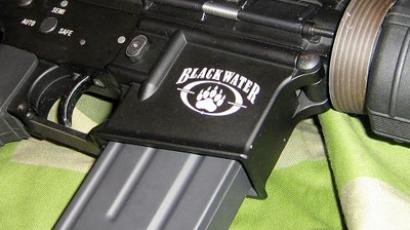‘Blackwater acted under auspices of US government’
The US Department of Justice is letting a military contractor away with a fine despite it being charged with grave crimes. Scott Horton, contributing editor to Harper's Magazine, tells RT the US government has reasons to fear the firm going on trial.
Academi, the group formerly known as Blackwater, must now fork out US$7.5 million to avoid criminal prosecution – an amount which is unlikely to do it any harm.RT: What do you make of this deal?Scott Horton: The amount that’s being paid is a real pittance. As these things go generally, this is an absolutely tiny sum. On the other hand, Blackwater is not completely out of the woods yet. What they got here is a deferred prosecution agreement – that is, they have time to persuade the Justice Department not to prosecute. The Justice Department gets an extension in the statute of limitations period to continue its investigation. But that being said, these sorts of agreements aren’t entered into, unless the government thinks dismissal – that is non-prosecution – is a probable outcome. So obviously, Blackwater has got to be delighted with this.RT: But there are some serious allegations we are talking about. Surely, they should be facing criminal prosecution at this stage, rather than just getting off with a fine.SH: I think that’s right. I think one thing that comes out of this is that we get a really deep view into the way Blackwater was conducting business around the world, and its provision of arms and sophisticated communications equipment to other governments and not-quite-governments. One thing that comes out of these papers is that a lot of this is being done in a very, very close relationship with the United States – remember, Blackwater is a principal contractor for the Department of State. It appears that in many of these dealings the Department of State in opening the door for Blackwater and helping Blackwater sell its services to other governments. This has to do with one of those governments where Blackwater didn’t get approvals.RT: So a trial would give away too many secrets US authorities don’t want be known about?SH: I think that’s right. In fact, I think that was threatened by [the company’s founder] Erik Prince at one point that, if there were a prosecution, things would come out that would be damaging to the US government. And I think we see from the settlement agreement, the papers behind it – there seems to be a lot of substance for that, because a lot of what Blackwater [Academi] is doing is under the auspices of the US government.RT: The firm has a little over a year to convince the government its criminal activities are in the past, but with such a checkered history, can this contractor be trusted?SH: I certainly don’t think that. They’ve changed their name two times and they’ve changed some of the personnel in senior echelons, but the reputation does not seem to be materially changed. They are still more or less the cowboys of the industry operating on the edge. Although I think it’s probably true that they have put in controls with respect to export licenses and tracking the movement of firearms, and things like that – they’ve probably done some routine regulatory things. But I’d suspect they are involved in an awful lot of business that they don’t want to see come out, and that the US government probably also doesn’t want to see the light of day.RT: How have these military contractors affected the perception of the US around the world?SH: It’s been devastating. I think we can look at specific cases. Certainly in Iraq. Blackwater was kicked out of Iraq, and they were kicked out after the Nisoor Square incident, in which 19 Iraqis were murdered by Blackwater agents for no good reason. Blackwater said they came under fire – that was just untrue. There was a backfire in an automobile, and that turned into a massacre by Blackwater employees. Yet no one has been held to account by that. We have comparable incidents in many, many other countries.So they are basically soldiers of fortune, out there for hire. And their operating principle seems to be “shoot first, ask questions later.”













